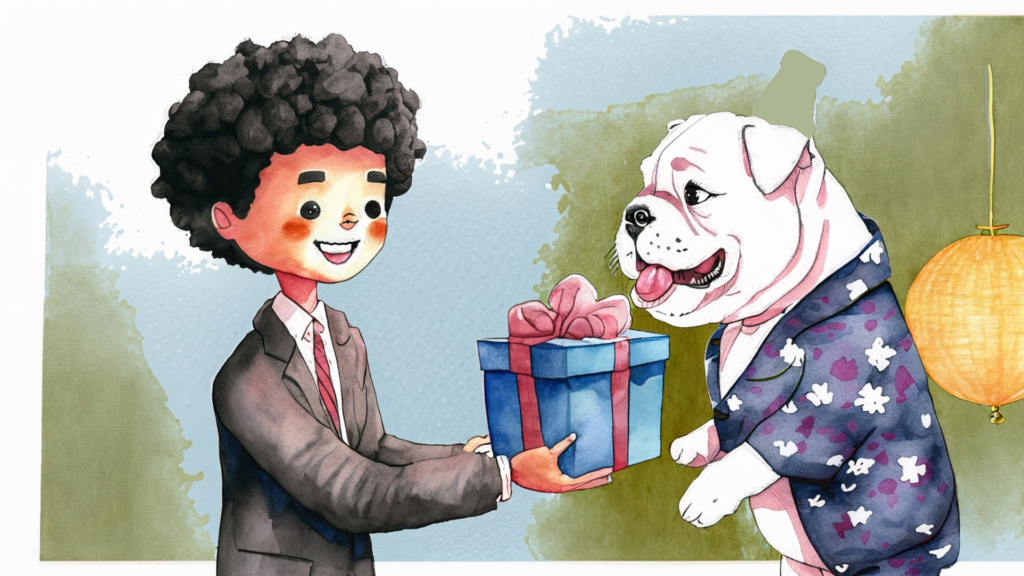レッスン7 おいわいしにきました


ごめんください。 ブル社長、むかいです。 おいわいしに来ました。
gomenkudasai. buru shachō, mukai desu. oiwaishi ni kimashita
Excuse me. I’m Mukai. I’ve come to congratulate you, President Bull.

はい、これケーキです。あ、のみものがありませんね。
hai, kore kēkidesu. a, nomimono ga arimasen ne
Here’s a cake. Oh, there’s no drink, right?

ぼく、コンビニにのみものをかいにいきますよ。
boku, kombini ni nomimono wo kaini ikimasu yo
I’ll go buy some drinks at the convenience store.

ごめんください。 こいずみです。
gomenkudasai. koizumidesu.
Excuse me. I’m Koizumi.

こいずみさん、それは何ですか?
koizumi-san, sore wa nandesu ka
Koizumi-san, what’s that?

たんじょうびプレゼントをとどけにきました。これはワインです。
tanjōbipurezento wo todoke ni kimashita, korewa wain desu
I came to bring a birthday present. Here’s some wine.

あ、会社のひとたちも、ブル社長に会いにきましたよ。
a, kaisha no hitotachi mo, buru shachō ni ai ni kimashita yo
Ah, some colleagues from the company have also come to meet President Bull.
ブルしゃちょう! おたんじょうびおめでとうございます!
buru shachō! otanjōbi omedetōgozaimasu
President Bull! Happy birthday!!

| ごめんください gomenkudasai | Excuse me. |
| おいわいします oiwaishimasu | celebrate |
| ケーキ kēki | cake |
| のみもの nomimono | drink |
| コンビニ kombini | convenience store |
| かいます kaimasu | buy |
| プレゼント purezento | present |
| とどけます todokemasu | bring |
| ワイン wain | wine |
| 会います aimasu | see |
In Japanese grammar, “The stem of the verb without ‘ます’+にいきます/にきます” is an expression used to indicate the action of going to a specific place to perform a particular activity. In English, this structure can be translated as “go to (verb)” or “come to (verb).”
Here’s a breakdown of the structure:
- Take the stem of the verb by removing the polite ending “ます” (masu).
- Add “に行きます” (ni ikimasu) to indicate “go to (verb)” or “にきます” (ni kimasu) to indicate “come to (verb).”
・かいに行きます go to buy
(かいます buy + にいきます go)
・おいわいしにきます come to celebrate
(おいわいします celebrate + にきます come)

のみものをかいに行きますよ。
nomimono wo kaini ikimasu yo
I’m going to buy a drink.
| テスト tesuto | exam, test |
| うけます ukemasu | take (a test) |
| しらべます shirabemasu | inspect |
Please rearrange the words
Q1:I’m going to take the test at 10 a.m.
Q2:The police are coming to inspect my house.
1. 午前10時にテストをうけにいきます。
2. けいさつがわたしの家をしらべにきます。




